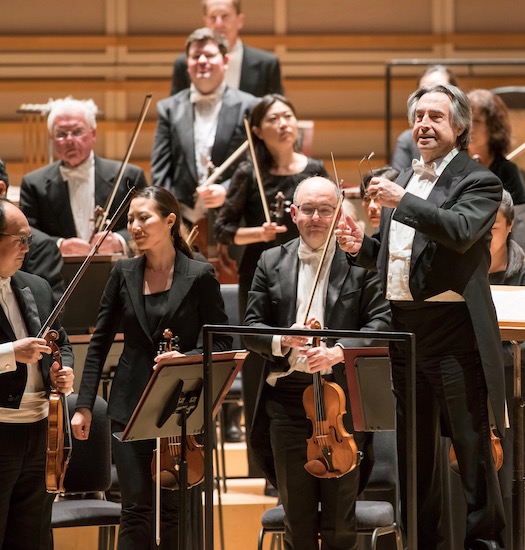Muti, Chicago Symphony bring fresh life to Russian standards at Arsht

Riccardo Muti speaks to the audience following the Chicago Symphony Orchestra’s concert Wednesday night at the Arsht Center in Miami. Photo: Anne Ryan
Some orchestral works suffer from constant overexposure while much fine music is rarely heard. Still, there is a good reason why most warhorses have achieved great popularity. Only the seasonal run of routine performances has dimmed their luster. When a great conductor and world-class orchestra tackle that familiar repertoire, often the results can be revelatory.
On Wednesday night Miami’s Arsht Center classical series presented the Chicago Symphony Orchestra under music director Riccardo Muti playing two symphonic mainstays by Tchaikovsky and Rimsky-Korsakov. With the dust of mundane performance standards removed, these Russian showpieces glowed anew as true masterworks.
The burnished tone of two clarinets launched Tchaikovsky’s Symphony No. 5 in E minor, and the undertow of (usually submerged) violas came through with emphatic clarity. From the first bars, Muti generated the work’s emotional velocity through supple phrasing rather than exaggerated bombast. Tchaikovsky’s melodies soared under Muti’s baton and his keen ear for detail drew out the inner voices. The ensemble’s storied brass section emerged with strength at the climaxes with their mellow corporate blend bereft of harshness. At the conclusion of the first movement, the throbbing chords played by eight double basses could be felt as well as heard.
Daniel Gingrich’s large, vibrant horn sonority took flight in the Andante cantabile solo, the music spaciously shaped by Muti. Hair-trigger shifts in meter and intensity allowed the music to flow with a natural progression of pulse and line, making the brass intrusion of the fate motif all the more fierce. Muti’s astute blending of the winds into the strings’ textures brought out the darkness and melancholy of the third movement waltz. In the central episode, Stefán Ragnar Höskuldsson’s silvery flute and Jennifer Gunn’s bright piccolo emerged clean and precise.
Muti conjured up imperial Russian grandeur with the moto theme’s appearance in the finale before unleashing torrents of vigorous string figures that made manifest the Allegro vivace marking. The collective winds were well matched in timbre and superb in solo moments. (Even though Muti kept his hands raised, inevitably a few audience members applauded early at the rest before the coda.) The usually blatant final passages were more regal, the theme returning roundly triumphant. In a score that can sound episodic, the intelligence and sophistication of Muti’s approach restored the glamour of Tchaikovsky’s symphonic writing.
Rimsky-Korsakov’s Shererazade served as a showcase for the orchestra’s terrific first-chair players. With astute pacing and balancing of sections, the composer’s Arabian Nights fantasia gleamed with reams of exotic color.
The sweetness of concertmaster Robert Chen’s violin solos were the fulcrum from which the score’s multilayered hues coalesced. Muti’s carefully scaled dynamics ranged from the softest rumbles to forceful brass volleys and his direction unearthed the work’s subtleties of orchestration. In the storm-tossed waters of “The Sea and Sinbad’s Ship,” Muti added an appealing touch of sinew to the strings’ lustrous sound.
The warmth and rounded tone of Keith Buncke’s bassoon gave expressive weight to the Orientalism of the second movement “Tale of the Kalandar Prince” and John Sharp’s beautifully flowing cello solo was devoid of syrupy excess. Indeed Muti’s freshly scrubbed soundscape elevated and gave transparency to the most minute details, even including the triangle.
His tempo for “The Young Prince and the Young Princess” was slightly faster than in many readings but all the more effective. The music’s sensuous lyricism took forward motion and, in the contrasting middle section, Muti kept the percussion rhythms in check to allow the wind parts greater clarity. (New World Symphony member Ryan Roberts replaced the CSO’s English horn player Scott Hostetler, who had become ill during the program’s first half.)
The opening of the final movement took off at a furious clip. Muti avoided ratcheting up the crescendos of “Festival at Bagdad” too soon, letting the climaxes build organically. The conductor’s leadership restored Rimsky-Korsakov’s thematic richness and sonic drama to a movement that can sound diffuse. Chen’s violin continued to gleam in the final bars, and the firepower and disciplined execution of the CSO made this Sherehazade a symphonic tour de force.
After a long cheering ovation, Muti returned, commenting that the Miami audience did not immediately head for the exits like audiences in West Palm Beach.
He offered “a little Italian music” for an encore. The Intermezzo from Giordano’s opera Fedora allowed Muti to indulge his passion for opera, and this mostly string transcription was the perfect Italian sorbetto to end an evening of glorious orchestral playing.
The Arsht Center classical series continues 8 p.m. March 7 with violinist Itzhak Perlman and pianist Rohan Da Silva playing Schnittke’s Suite in the Old Style, Beethoven’s Sonata No. 9, Dvorak’s Sonatina in G Major and works TBA. arshtcenter.org; 305-949-6722
Posted in Performances
2 Responses to “Muti, Chicago Symphony bring fresh life to Russian standards at Arsht”
Leave a Comment
Thu Feb 28, 2019
at 12:33 pm
2 Comments







Posted Feb 28, 2019 at 3:30 pm by Heide Rice
Agree with you 1000 times! These Chicago concerts were for me a religious experience. Can we please get Arsht and Kravis to coordinate an annual winter residency? This orchestra with Maestro Muti is the absolute 24k gold standard.
Posted Feb 28, 2019 at 7:52 pm by Oscar Torres
CSO showed why it’s considered top 5 in the world and Muti maybe the #1. What a night! “What an Orchestra”!
In my opinion, the best interpretation ever for both pieces.